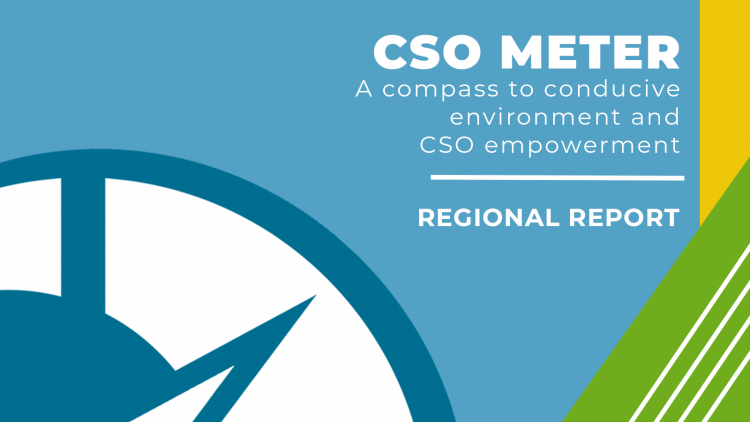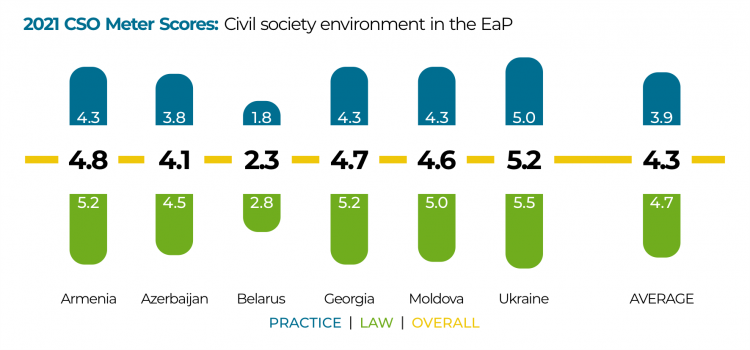War, emergencies, the pandemic and political turbulence significantly affected the environment for CSOs in the Eastern Partnership (EaP) region in 2021. Their space to operate and possibilities for activism faced restrictions, both in law and in practice. However, we have also seen some positive developments such as the improved state funding processes in Armenia and Ukraine; or the opening of avenues for cooperation in Moldova or the new civil society strategy in Ukraine.
The report analyses 11 key areas of civil society operation, such as freedom of association, participation or access to funding in 6 countries: Armenia, Azerbaijan, Belarus, Georgia, Moldova and Ukraine. It covers the period between September 2020 - December 2021, and builds on the 2021 country reports published earlier.
As a novelty compared to earlier reports, the 2021 report also assesses digital rights as a new area and introduces scoring: for both law and practice the scores range from 1 to 7, where 1 signifies the lowest possible score (extremely unfavourable – authoritarian environment) and 7 signifies the highest possible score (extremely favourable environment).
2021 CSO Meter Scores
Ukraine scored highest in fulfilling the overall standards of law and practice of the CSO environment in the EaP region. This is due to
- the enabling conditions in relation to freedom of association;
- the existence of a more equitable treatment between businesses and CSOs than in the other EaP countries; and
- the exercise of the right to participation which gives CSOs the opportunity to take part in the decision-making process and the well-developed CSO-government cooperation.
Scoring lowest is Belarus, where freedoms and the overall work of civil society took the hardest blow with severe prosecution, sanctions and forced liquidations for both unregistered and registered CSOs.
Key trends
The CSO Meter also identified 5 key trends in civil society environment:
- Crisis measures (to tackle COVID-19 and conflict) limited civic freedoms and further affected the CSO environment.
- Digitalisation progresses faster than the provision of related protections and the enjoyment of digital rights.
- CSOs face increased attacks, stigmatization, and surveillance.
- Limitations and burdensome requirements on access to funding.
- AML/CTF measures have further continued to create burden over CSOs.
Key priorities
The report also points out the priority areas where immediate advancements through EU support, progressive laws and practices are needed:
- Freedom of Association and Access to Funding should be ensured for everyone (especially in Belarus and Azerbaijan – creating an enabling environment for registration and ensuring operation without interference, as well as lifting restrictions on foreign funding and other funding mechanisms.
- State Support should be further developed in the region as an important source of CSO sustainability.
- State Protection of CSOs against interference and unjustified attacks is key to ensure that they can enjoy their civic freedoms and operate in the CSO environment. Appropriate and effective investigation of attacks against CSOs and activists is needed.
- States should ensure meaningful participation in decision-making processes, particularly in times of crisis. Meaningful CSO-government relationships are necessary for the CSO environment to further develop.


